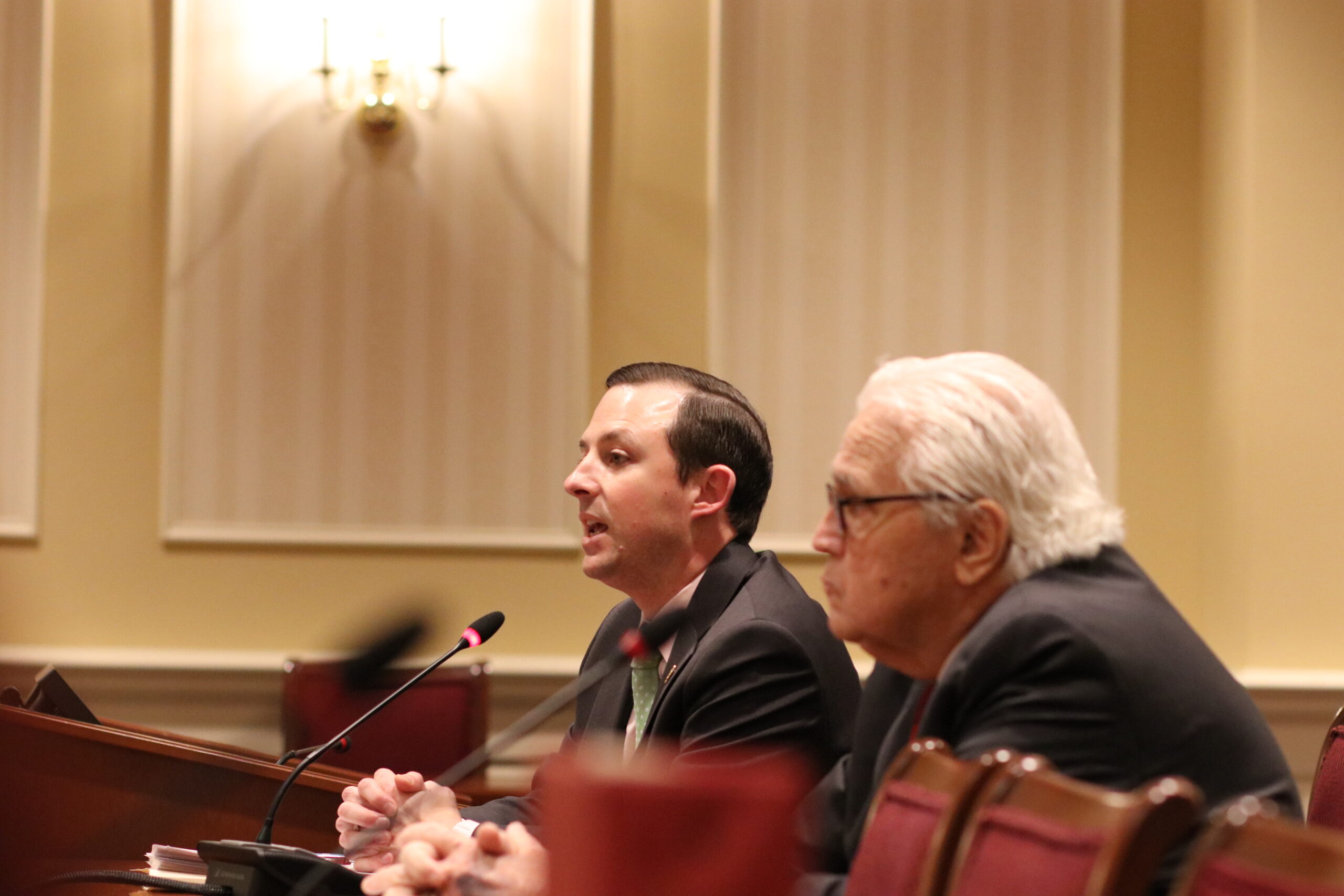
As Maryland’s Senate president likes to say, creating a system of elite 21st century public schools will require an overhaul of Maryland’s 19th century tax code. That could start, Senate President Bill Ferguson (D-Baltimore City) said Wednesday, by taxing online ad sales by large tech companies that tailor advertisements based on a user’s personal data.
“At some point, we didn’t tax cars because they didn’t exist,” Ferguson said at a hearing of the Senate Budget and Taxation Committee. “When industries are created, the question is whether or not they should participate in building the civic infrastructure. That’s the cost of civic society.”
Ferguson is pressing for passage of Senate Bill 2, which is cosponsored by Senate President Emeritus Thomas V. Mike Miller Jr. (D-Calvert) and would impose a graduated tax on companies with more than $100 million in global digital advertising revenue. The tax – between 2.5% and 10% on digital ad sales targeting Maryland IP addresses ― could raise up to $250 million annually once fully implemented, according to legislative analysts. The revenues would be directed to education reform proposals by the Kirwan Commission, expected to cost the state up to $1.2 billion annually by 2030.
Ferguson and Miller were joined in advocating for the bill by economist and Nobel laureate Paul Romer, who said such a law could not only raise money for education, but could also deter tech companies from tracking users and manipulating ads based on collected personal data.
“This model would undermine the monopolies that control all of this information about everything that we do and help restore the competition that gives people choice in what they buy, what they say, what they read,” said Romer, a former chief economist at the World Bank.
Global digital advertising revenues have exploded in recent years. According to a 2018 report by the Interactive Advertising Bureau, mobile digital advertising revenue grew to $70 billion in 2018, compared to $7 billion in 2013. By 2024, that figure could be more than $234 billion.
“That growth rate without any return to the communities it’s serving is just unconscionable,” said Strong Schools Maryland Executive Director Joe Francaviglia, who supports the bill.
But tech company representatives said the measure would impose a tax on protected free speech, discriminate against some businesses over others and could run afoul of federal laws including the Internet Tax Freedom Act.
Robert Callahan, senior vice president of state government affairs for Internet Association, which represents large global tech firms including Facebook, Twitter and Google, said the industry was being unfairly villainized in debates.
“There’s a reason this industry is so successful and so large – because it is the most cost-effective way to get a message out than has ever existed before,” Callahan said.
While large platforms are home to digital ad sales, small businesses benefit by reaching consumers who receive information most relevant to them.
“There really is tremendous benefit out there and I just don’t want that to be lost in this conversation,” Callahan said.
Some committee members also expressed concern about the bill.
Sen. Johnny Ray Salling (R-Baltimore County) asked Ferguson why Maryland should be the country’s test case for the proposed tax.
“This is the new economy in action. Someone has to lead. And Maryland should be that leader,” Ferguson said.
Sen. Andrew A. Serafini (R-Washington) said lawmakers needed to acknowledge that the bill would be subject to an immediate legal challenge if passed.
He asked Ferguson what path the measure would take in becoming law.
“Very similar to the path South Dakota took in discussions with Wayfair,” Ferguson acknowledged, referencing the U.S. Supreme Court’s 2018 decision that allowed states to collect tax from online remote sellers. (Maryland’s implementation of online sales taxes is what’s largely funding the first three years of Kirwan Commission reforms.)
“I don’t want to be the leader on this,” said Serafini, who worried the bill might drive business from the state. “Image is my concern.”
Ferguson acknowledged that the bill needs amending. A workgroup of committee members is meeting to iron out issues with the digital tax proposal and others.
The digital tax bill was the most novel measure ― and potentially the most lucrative one ― heard by the committee on Wednesday.
Other bills presented to the panel Wednesday would legalize sports betting in the state, require combined corporate reporting, change state income tax collections for hedge fund managers and hike the sales tax on tobacco products.
Taken together, the bills could generate more than $600 million in new revenue annually by 2022, according to fiscal analyses.
The goal of the proposed revenue measures should be to promote economic growth and avoid levying direct taxes on average Marylanders, Ferguson said.
Miller said he supports several of the revenue bills, including raising the tobacco tax ― though after a hearing he expressed concern about a provision that would allow cities and counties to impose an additional local tax.
Lobbyist Bruce C. Bereano, representing the Maryland Association of Tobacco & Candy Distributors, said the provision would allow local governments to raise taxes so high as to effectively ban tobacco products.
As introduced, the measure from Sen. Cory V. McCray (D-Baltimore City) could generate $62.9 million in additional state revenues next fiscal year. McCray’s proposal would increase the tax on a pack of cigarettes from $2 to $4, increase the tax rate on other tobacco products from 30% of the wholesale price to 86%, and imposes an 86% tax on electronic smoking devices.
The combined corporate reporting bill, sponsored by Sen. Paul G. Pinsky (D-Prince George’s) has been regularly debated ― and opposed by leading business groups ― in the General Assembly since 2003. But Pinsky said Maryland is now among a minority of states that have not implemented the change. That measure could generate $172.3 million by the 2022 fiscal year, according to analysts.
Budget and Taxation Committee Chairman Guy J. Guzzone (D-Howard) said a workgroup is crafting a compromise sports betting bill. Debate over establishing a legal sports betting industry in the state is focused on where betting could occur ― in casinos, racetracks, OTB parlors or on mobile phones ― and the amount of the state’s take.
Guzzone said Wednesday he was confident the committee would move a sports betting measure to the Senate floor. It’s also “very likely” the committee will move forward on the digital ad sales bill, he said.




 Creative Commons Attribution
Creative Commons Attribution